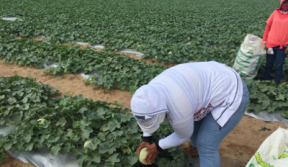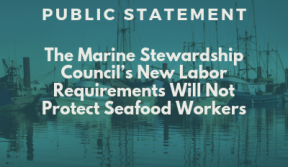Publication Date:
Executive Summary
Peruvian unions, Peru Equidad, and the International Labor Rights Forum (ILRF) have filed a complaint with the U.S. Department of Labor, alleging that the Government of Peru is failing to adhere to the labor standards contained in the United States-Peru Trade Promotion Agreement (PTPA).
The complaint alleges that the Government of Peru is failing to enforce basic labor laws in its garment, textile, and agricultural export sectors, which together employ hundreds of thousands of workers who produce billions of dollars of goods for the U.S. market. It also breaks new ground by testing a key provision of the “May 10th Agreement,” arguing that Peru’s Non-Traditional Export Promotion Law fails to comply with minimum standards on freedom of association adopted by the International Labor Organization (ILO).
The submission enjoys the support of all four of the major Peruvian union confederations and the federations that directly represent textile, garment, and agro-export workers. It contains a list of recommendations for the government of Peru to come into compliance with its obligations under the PTPA.
Garments and Textiles
Since the PTPA entered into force in 2009, Peruvian textile and garment exports to the U.S. have increased by 10 percent, reaching $660 million in 2014. The industry contains some of the country’s largest, most profitable companies who sell to well-known global brands like VF Corp. (The North Face, Nautica), PVH Corp. (Calvin Klein, Tommy Hilfiger), and Guess.
The vast majority of workers in the sector are employed under Peru’s Non-Traditional Export Promotion Law, which exempts employers from key parts of the general labor code by allowing them to hire virtually their entire workforce for an unlimited duration on a series of renewable, temporary contracts, some as short as 15 days. Garment and textile employers have taken advantage of the special law by systematically declining to renew the contracts of thousands of workers who joined unions in an effort to improve wages and working conditions.
The complaint argues that the Non-Traditional Export Promotion Law fails to provide workers with their fundamental right of freedom of association as required under the PTPA. This is not the first-time this special export law has been in the spotlight: The ILO has expressed severe concerns about the law, and in 2013 five U.S.-based multi-nationals (including Nike, New Balance, and PVH Corp.) wrote a public letter to President Ollanta Humala stating their concern that it may violate their corporate codes of conduct which require respect for workers’ fundamental labor rights.
The complaint also presents a number of emblematic case studies which show how the Government of Peru is failing to enforce its own labor laws in the textile and garment sector. Major Peruvian garment and textile companies violate Peruvian labor law with virtual impunity, dismissing workers for union activity, employing workers on fraudulent contracts, and failing to pay legally mandated bonuses. Even in cases where labor inspectors have found violations, fines are too low to deter employer misconduct and often go unpaid.
Highlighted cases include:
- Topy Top: Topy Top, one of the most prominent Peruvian garment and textile companies, has waged a well-documented campaign to crush SINTOTTSA, the union of Topy Top employees, by targeting union members for dismissal and employing workers on fraudulent short-term contracts. Since 2012, the company has effectively ignored orders from the labor inspectorate to convert 740 temporary workers to permanent employees.
- Hialpesa: Since 2013, Hialpesa, supplier of garments to Nautica, Guess, and The North Face, has effectively ignored a labor inspectorate order to convert over 1000 workers to permanent contracts. In 2014, the company threatened to close a spinning plant where 90 percent of union members worked and an independent report found that management violated the law by secretly approaching individual union members to offer them buyouts.
Agricultural Exports
Peru’s booming agricultural export industry (including asparagus, avocados, peppers and other products) employs over 300,000 workers and is the leading non-mining export to the U.S., topping $1.2 billion in 2014.
Employers in this sector routinely violate Peruvian labor laws and regional labor ministries have not shown the capacity or political will to enforce the law. The most common abuses include health and safety violations, various forms of retaliation for joining a union, and the fraudulent use of seasonal or temporary contracts. Some of the largest employers have even filed frivolous criminal cases against union leaders who have led legal strikes.
Highlighted cases include:
- Camposol, Peru’s largest agro-export company, supplies avocados and mangos to Walmart. It hires the vast majority of its workforce of over 13,000 on various forms of temporary contracts. According to workers, company management routinely retaliates against workers who join a union or lodge complaints by placing them on “temporary leave” or refusing to renew their short-term contracts. In 2013, the company refused to honor an existing collective bargaining agreement and even filed frivolous legal charges against union leaders for exercising their right to strike.
- Agrícola Virú, one of the largest Peruvian agro-exporters, exports avocados, artichokes, and mangos to General Mills and Trader Joe’s. It employs over 8,000 workers largely on temporary and seasonal contracts. According to a recent report, the company has used a wide range of anti-union tactics to deny workers their right to freedom of association, including the harassment of union members and leaders with the threat of layoffs and dismissals. In 2013, the company filed criminal defamation charges against a union leader for speaking on a local radio show about the poor working conditions in the agricultural sector.
Recommendations
Consistent with Article 17.7 of the PTPA, the complaint recommends that the U.S. government initiate formal labor consultations with the Government of Peru. These consultations should include, at a minimum, the following issues related to Peru’s non-compliance:
- The repeal of Articles 32, 33, and 34 of the Non-Traditional Export Promotion Law (Decree Law 22342) and the inclusion of the relevant workers under the general labor code.
- The repeal or modification of the Agricultural Promotion Law (Law 27360) and the inclusion of relevant workers under the general labor code.
- The strengthening of the administrative and judicial systems to ensure employer compliance with labor standards, including public reporting on the collection of fines.
- Strengthened oversight of employer use of temporary contracts, including measures to detect fraud, enhanced penalties, and the immediate conversion of workers to permanent contracts as required by law.
- Enforcement of the legal requirement that employers in the textile and garment sector pay the “prima textil,” an annual bonus to which workers are entitled in addition to their regular salary.

